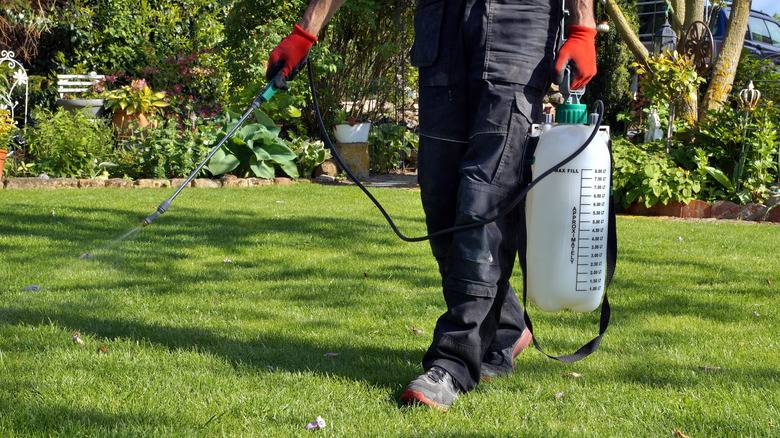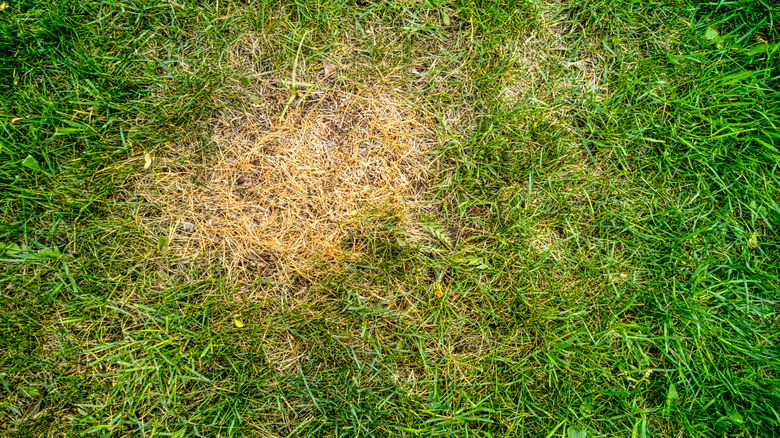The Key Ingredient That Will Turn Your Lawn A Healthy Dark Green In Just Days
Some homeowners like to spend a lot of time working on their lawns, making them as green and lush as possible. There are multiple natural ways to keep your lawn green, and you also can use fertilizer products as an easy way to help the grass look greener. However, when all your work doesn't seem to be paying off, and the grass has a yellowish tint just before you have a big outdoor gathering planned, you may want to apply a quick boost to the lawn to give you that desirable dark green color. One of the best options is to apply liquid iron to the yard.
Iron helps common strains of grass to maintain a deeper, healthier green color during the hottest weather in summer, when these plants are typically under the greatest levels of stress. Liquid iron not only improves the color of the grass, but it can also strengthen the root system, allowing it to absorb nutrients and water more efficiently. Golf courses often use this application, so it's also a great choice for homeowners who want a lush feel to the yard.
Liquid iron is commonly available at hardware stores and at online retailers in large plastic jugs. Additionally, it appears in granular fertilizer products. That being said, liquid fertilizers tend to work faster than granular fertilizers, so if you need a deep green color quickly, an application of the liquid product is going to give you the better results.
How to apply liquid iron fertilizer to green up your lawn fast
Typically, you should apply liquid iron to your lawn in summer, as this is the time when temperatures are high enough that the grass is growing as vigorously as possible. The individual plants are more likely to absorb iron and other nutrients effectively during this time. The best option is chelated liquid iron, as it ensures the highest level of absorption from the plants and works faster than non-chelated products. It is also toxic to weeds.
To apply the liquid iron, follow the directions on the product that you select, including diluting it with water to create the proper level of concentration. Make use of a handheld or backpack pump sprayer to apply the mixture to the lawn. It's important to go over the entire space as evenly as possible. You may want to practice using the sprayer in a less visible portion of the lawn until you feel comfortable with how it works. Some hardware stores sell these products in ready-to-use spray jugs, meaning you don't need to dilute them with water. They are a good choice for small areas because they can be pricier than products that need dilution.
With most of these products, the instructions may tell you to water the lawn both before and after the application process. Having extra water from your sprinklers on the grass aids in the absorption of the iron mixture.
Dangers of using liquid iron on your lawn
One of the disadvantages of using liquid iron on your yard is potential damage to the grass when adding it too many times during the year. Although it's okay to apply liquid iron occasionally for a quick greening of the grass, avoid doing this too often. Typically, four times per year is the maximum suggested application schedule. That being said, before choosing to apply it on a regular schedule, consider testing the soil to see whether it truly is iron deficient.
It's important to avoid over-spraying liquid iron on your lawn as well. If you end up placing too much on the grass, it could cause discoloration, almost as if the grass gets burned. With liquid iron, this most commonly occurs across small parts of the yard, as you may have over-sprayed the mixture on a few spots, rather than the entirety of the yard.
It's important to note that an application of the solution will take up to an hour to dry, so you should keep kids and pets off the grass during this time. Read the instructions on the product label to determine exactly how long it takes to dry before people can start walking on it again. It's also important to avoid inadvertently spraying the iron on concrete areas like patios and driveways, or even on painted wood. It can cause staining that is difficult to fix.

